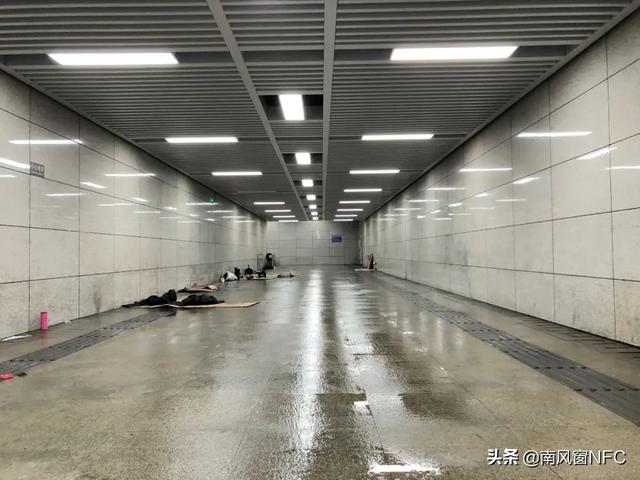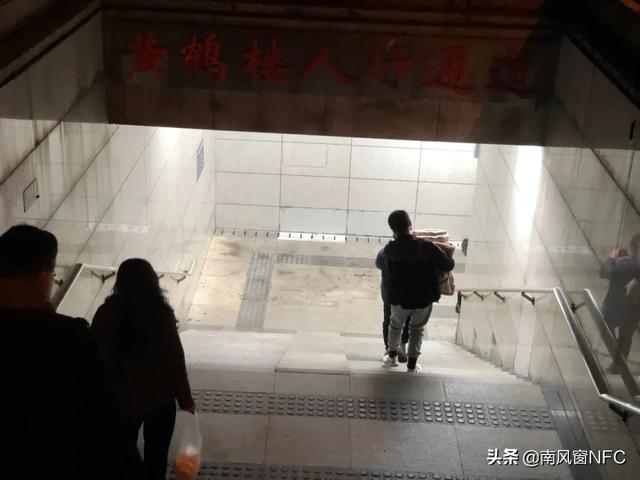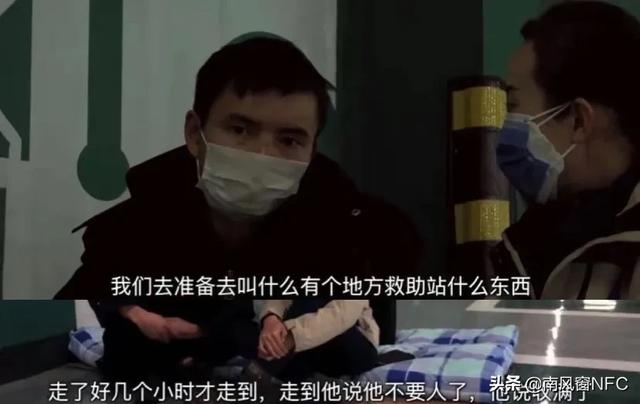Author: XIANG Zhilin (South Reviews)
Translator: Maggie Pan (COVID-19 Readings)

The weather forecast showed that Wuhan would be raining continuously, for four days in a row. However, before the rain fell, the place where Gao Qiang lived was already soaking wet.
He lived in an underground passageway in Wuchang District. On February 24, just after 2 p.m., more than ten people arrived in the passageway. They connected the water hose and flushed the entire ground.
Almost an hour later, the people who flushed the ground left, Gao Qiang went down to “rescue” his luggage.
His luggage was all wet, including the bed sheet and quilt on the floor, and a cotton coat sent by the Red Cross two days earlier. He couldn’t bear to lose the cotton coat, and hang it on the iron railing at the entrance.
There were seven people living in the passageway, who were stranded in Wuhan and couldn’t afford to stay in a hotel.
They saw that the bedding and clothes were getting wet by the water spraying, but they were too scared to come forward, because “the people who came in wore law enforcement uniforms.”
Gao Qiang said: “It is a special time, we understand all that. But for us, even if living in the passageway, it is better than running in the street with nowhere to stay.”
Stranded in Wuhan
Gao Qiang lived in the underground tunnel for about 10 days, he came to Wuhan to look for a job on the construction site. The dormitory for the construction workers was emptied after the site was closed, but he didn’t want to go home.
After working for a year without earning much money, he just wanted to start again as soon as possible.
What he did not expect was that Wuhan was quarantined on January 23. “Now I am really not going back, “ Gao said with a bitter smile.
He first stayed in a small hotel for 30 yuan a day, but the food got more and more expensive, “that cost at least 100 yuan a day.” He soon couldn’t afford to live in the hotel.
He figured out two ways, first was to check out from the hotel and sleep on the street, saving up the room cost for each day to buy more instant noodles. Second, find a job. He figured, Wuhan must be short on labor now. He started from Hankou, going in whenever he saw a residential community, asking if people need temporary workers? When he saw a sanitation worker on the road, he would also ask if was there any job opportunity?
“No. “
“No, no job.”

He didn’t know how he got to the underground passageway. Gao Qiang said that he only remembered his legs got swollen from all the walking. Because of lying on the cold ground, he could not straighten his back, but still struggled to walk. When he got to the the passageway, someone took pity on him and gave him a mat.
That’s how he ended up settling there.
The Yellow Crane Tower tourist site was still pretty well lit, surrounded by a group of ancient architecture, it was hypnotizing in the twilight hours, yet there was not a single tourist. On February 24 after 6 p.m., I went under the tunnel. Three hours after the flushing, water was still flowing on the ground, the water hose laying on the stairs. The passageway is at the west side of the Yellow Crane Tower Park, opposite of the Museum of Wuchang Uprising of 1911 Revolution.
The passageway was no longer livable, they could only wander around the woods near the park.
Fang Jian “rescued” a bucket and a bag, that was his livelihood, his tools for begging. He was a professional beggar who had been begging since 1998. He was from Fuyang, Anhui Province, age 37.
His right sleeve was empty, his hand amputated at the age of 15. The doctor said it was bone necrosis, “it must be treatable now. But back then there was no capability and no money to treat,” he said.
When the flushing was happening, Fang Jian wandered around the park, catching a glimpse now and then, “they connected the tap and sprayed directly at the quilts.”
His belongs were all down there but he was too afraid to stop them, he said, “These people, they do things to us, never give reasons. To be honest, we are all inferior.”

Sheng Kuan, another stranded man, and Fang Jian are fellow villagers from Anhui. He also worked in Wuhan as a temporary worker, but had nowhere to go after the city was quarantined.
Old Tan is one of the older ones in this group, with a more tortuous experience. He worked in Shantou and was returning to his hometown Xiangyang before the Spring Festival when he got stuck passing by Wuhan.
Old Tan had sent all the money back home, except for a little left for himself for the trip, which was now not even close to enough. When he told his family he was safe, they wanted to send money to him . He declined, “That was not much money in the first place, let me just make do.”
Gao Qiang said that the family did not know he was “wandering around” yet. There is a 70-year-old mother at home, fortunately taken care of by an older brother. But the elderly mother would be so worried if she knew the truth. Gao Qiang couldn’t bear to tell them.
Nevertheless, the money had run out. Gao Qiang borrowed 200 Yuan from a former coworker, but those were quickly spent as well. He looked forward to the news of “Wuhan unquarantined” every day, but among various rumors, the days dragged on day by day.
“Another month, I really can’t make it,” he said.
When Gao Qiang, Fang Jian were chatting with me, Old Tan and Sheng Kuan took the last bag of instant noodles and went to the hospital for hot water, but the hospital nearby was surrounded by roadblocks, preventing them from entering. They walked back and forth for more than an hour before getting boiling water at a children’s hospital.

As to Gao Qiang and Fang Jian, they did not even have a single bag of instant noodes. They had been starving all day.
Gao Qiang said that a man started looking for food in trash cans, however, only the hospital trash cans still had food in it. “He picked up a boxed lunch, someone had taken only a couple of bites. I thought the food still looked decent,” said Gao Qiang, but he dare not eat such, being afraid of the virus.
The man who looked for food in the trash cans is very young, only 27 years old. He was also at the park, sitting on a bench from afar. He said he came to Wuhan last September, had not found a job. He did not want to talk about much else.
In fact, they were very wary of outsiders. When the takeout I ordered for five persons came, Old Tan and Sheng Kuan were nowhere to be seen. Fang Jian and I walked around, found them on the side of the road, and asked them to eat while it was hot. But they declined, saying they had eaten.
Sheng Kuan reluctantly spit out the reason, he was worried about being photographed again. They had met several groups of people, some left them some supplies, and immediately took tons of pictures, “I am a grown man, with hands and feet, I can work normally, I just came into a difficult time, it is too shameful to be exposed like this.”
After making sure that they would not be photographed, they were finally relieved and took up the food to eat.
Gao Qiang said to me, “If it weren’t for the virus, we would not live in the passageway, and now being chased out. We also want to get back to work early, go to work like normal, make money to eat, there is just no way now.”
The Rescue
With no place to live now, Gao Qiang worried that when it really started to rain, it would be even more difficult for them.
Food is running out, even when you have the money. With strict management, small businesses are mostly closed, supermarkets are not open to individuals. The food they had now were purchased a few days ago, and some were offered by donors.
Gao Qiang remembered that three groups of people came.
“The second group came on February 21, claiming to be from the Red Cross, and they gave the most,” Gao said, the people who came gave them each seven masks, told them to wear them every day, and gave them mats, quilts, and cotton coats – the ones that got wet three days later. Each person also got about 10 cups of instant noodles.
The third group were volunteers, who came on February 23 and gave them two boxes of lunch each. Gao Qiang ate a box and saved the other box to eat the next day.

In order to save money, they were used to eating one meal a day, and ate it at night. Fang Jian said, fire was not allowed in the passageway, they had to quietly do it at night, cooking the noodles. They walked in the park during the day and soaked up the sun all day.
Every morning at eight or nine o’clock, some regular persons would come to take their temperature and issue masks. But they said this group was all for show. They just came to take the temperature of one nearest person, then took pictures. They also only offered one cup of instant noodle, and took photos again, “They were just showing that the work was done, and ignored the rest of the folks.” Fang Jian said.
They suspected that the men who flushed the passageway were sent by this group of people, too.
Exactly who were they? It didn’t really matter to them, their biggest problem was to address the present difficulties.
Things soon changed.
At 10 p.m. on February 24, the news that their bedding was sprayed by water spread among a group of volunteers. Someone immediately organized a rescue team, and in the early hours of the morning, six or seven people with new quilts and sheets rushed to the vicinity of Yellow Crane Tower Park.
However, there was no one in the park. With some clues, the volunteers found someone in another passageway – the two fellow villagers Fang Jian and Sheng Kuan. They got quilts, and an independent documentary filmmaker brought a big bag of snacks and insisted that they take it.

Sheng Kuan who had just complained about being photographed in the afternoon, did not refuse the camera this time, “I know good from bad, you guys are nice, so I don’t care,” he explained.
The documentary director was a young girl. She sat cross-legged in the tunnel, facing them. She prepared her own sheets and spent the night in the passageway with them. Sheng Kuan finally opened up and told his story with a smile. When it fell silent, one of the director’s male companions suddenly sang, “Leave my sorrow to myself, your beauty you take with you.” Sheng Kuan very much liked it, clapping and shouting, “nice, nice”.
Unfortunately, Gao Qiang, Old Tan and the other five people were never found. After it got dark, they packed up and each found their own “beds”, so no one knew where they were.
Fortunately, it still did not really rain that night.
A Night of Sound Sleep
The next day, on the afternoon of February 25, I found Gao Qiang in Yellow Crane Tower Park. He slept under the bridge all night last night. Luckily it had been warm, his coat was just about enough. In the latter half of the night, noises from the road woke him up. He went to the river and washed the cotton coat again, planning on wearing it again after it dried out.
“What a pity!” He shook his head with a sigh. At noon he touched his clothes, they felt almost dry, and he made up for some lost sleep under the bridge. But when he woke up, the cotton coat had been taken away by someone unknown.
He didn’t eat all day again. He went back to the park to hang out, and several others came back also. As soon as the volunteers got the news, they immediately began looking for quilts for the four people they had missed last night.
On this day, the officials issued a new policy, “The local government and related parties will provide rescue services to foreign personnel who are stranded in Hubei and have difficulties living due to restrictions on leaving Hubei.” In other words, they could get official assistance.

However, the policy had not yet been implemented for the moment. Fang Jian said he met a staff member once. Instead of asking him if he needed help, the staff member reminded him that he couldn’t live here and told him to go away.
Even if the government arranged for him a place to live, he did not want to go. As a professional beggar, he was very reluctant to receive relief, as he had been held in Zhejiang in 2004. “I was locked up for a few days, terrible food, terrible sleep, and they made me pay 300 yuan.”
Old Tan also ran into some staff. One day on his way back to the park, three uniformed guys called him to stop, told him now there was a place to stay, asking him whether he would like to go. Old Tan replied “No” and hurried away. He told me that he was mainly worried about the charges, and secondly, he was afraid of being infected.
The still would rather stay in the park, where they could walk, soak up the sun, and stay away from the crowds. It was just that accommodation was hard to find. Around 10 a.m., the passageway entrance was surrounded by iron fences, everything within was removed.

That afternoon, there was a new member in the park. He had a large bag on his back, a bag in his hand, dressed neatly and cleanly. He had just run out of money and couldn’t stay in the hotel any more, so he came to the park. He came from Zhejiang, and he didn’t want to say much else.
At about 5 p.m., I ordered a seven-person takeout delivery, which took and hour to get here, and they ate up quickly. However, the quilts that were located the second time needed volunteers to pick them up one by one. It’s dark and the temperature had dropped significantly.
At 8:28 p.m., volunteer Wei Ge arrived at the park and gave them the quilts. Gao Qiang and others said many thanks, but they didn’t have much time left for finding tonight’s accommodation. After a short while, the group dispersed.
At the intersection near the park, I met the guy who had searched in the trash bin, he looked very tired with all his belongs. He said he found two places to stay, but was woken up and chased away both times. He didn’t want to talk any more. He walked in the direction of the Yangtze River Bridge and disappeared after the intersection.
After 9 p.m., Gao Qiang finally found a new passageway where he was going to take a look. Actually, Sheng Kuan and Fang Jian were sleeping here, because this passageway is very remote, and had not been noticed for the time being. Gao Qiang was a little happy, he said: “Tonight I can finally sleep well.”

Ten some minutes after he went down, a man in a security uniform came, glanced into the tunnel, turned around and walked over. He complained to me, “These group of people just won’t go away, they are here again. Now apparently the government can take them in, cover their room and board, and they just won’t go.”
He was a staff member from the other side of the square. According to him, the materials donated by Red Cross were sent after he had made a report. The flushing of the passageway a couple days ago was also because of his report. “There is nothing I can do, they won’t leave, but the passageway can’t have people stay in there, that’s the regulation,” he said, adding that this passageway still couldn’t have people stay in there, he would report it again tomorrow.
(Some names are pseudonyms)